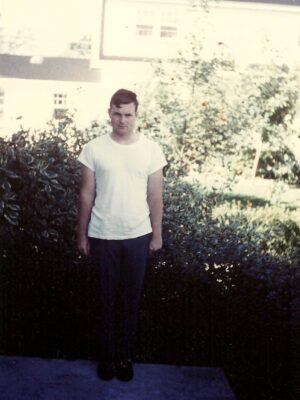 He ran around the house with his fist in his mouth, screaming and yelling. I was just a young child, watching in horror as I witnessed my brother Paul become unleashed like a wild animal. The so-called ‘fit’ lasted a long time and I remember my mother yelling at me to go to my room. There I must’ve sat, wondering what was happening to my brother. I could hear him screaming as though in pain; loud, agonizing screams, like those that would come from some sort of monster. I remember asking my mother, once Paul was calm, “Why did he do that?” My mother replied, “Because he’s sick.” That was all I was told, that my brother was ‘sick’. I imagine I may have been four or five at the time. I don’t remember everything that happened that day, but I do recall the above conversation with my mother and feeling somewhat baffled about my brother’s so-called illness. There were other tantrums that I was witness to but nothing like that one. It stands out in my head as a very traumatic event in my life.
He ran around the house with his fist in his mouth, screaming and yelling. I was just a young child, watching in horror as I witnessed my brother Paul become unleashed like a wild animal. The so-called ‘fit’ lasted a long time and I remember my mother yelling at me to go to my room. There I must’ve sat, wondering what was happening to my brother. I could hear him screaming as though in pain; loud, agonizing screams, like those that would come from some sort of monster. I remember asking my mother, once Paul was calm, “Why did he do that?” My mother replied, “Because he’s sick.” That was all I was told, that my brother was ‘sick’. I imagine I may have been four or five at the time. I don’t remember everything that happened that day, but I do recall the above conversation with my mother and feeling somewhat baffled about my brother’s so-called illness. There were other tantrums that I was witness to but nothing like that one. It stands out in my head as a very traumatic event in my life.
Had that happened today, I’m sure I would’ve been told exactly what was wrong with my brother and perhaps even given some tips from some expert as to how to respond in a situation like that. And I most likely would’ve had some decompression time with either my mom or my dad. But back in the days of ignorance, illnesses like Paul’s were never spoken about. They were a taboo subject. My parents probably presumed it wasn’t my problem and did their best to handle a very difficult and mentally challenged son, all the while trying to keep some normalcy in the household. That, as it turned out, was easier said than done.
As I recall, I didn’t really get what was going on with Paul. It never dawned on me that there was anything really wrong with him, he was just my older brother. I never really thought about how the world saw him. As a teenager, it was difficult to live with Paul. There was always a trauma, it seemed, when it came to him. And he would often say embarrassing things like “Hey Mom, Martha’s growing boobs.” It made me very uncomfortable. I used to wonder what it would be like to have a normal older brother, not one who blurted out stupid things in front of everyone. ‘Retarded’ was a word I became all too familiar with growing up. The  neighborhood kids made fun of my brother with comments like “Hey, where’s the retard” and to me they’d say “Yeah, you’re a retard just like your brother.” Kids are cruel, no question about that. Paul suffered years of ridicule from so many people. We all tried so hard to protect him. But I often wondered why, why did my brother have to be ‘retarded’? Why couldn’t he be normal like everyone else’s brother?
neighborhood kids made fun of my brother with comments like “Hey, where’s the retard” and to me they’d say “Yeah, you’re a retard just like your brother.” Kids are cruel, no question about that. Paul suffered years of ridicule from so many people. We all tried so hard to protect him. But I often wondered why, why did my brother have to be ‘retarded’? Why couldn’t he be normal like everyone else’s brother?
Eventually, as I grew up, I became more aware that Paul was different. Living with an obsessive-compulsive person who was intellectually handicapped was not an easy thing, like the times I’d have friends over. It was embarrassing. But once my friends got used to Paul it became easier for them to visit. I can imagine it must have been a bit scary for them, he could be downright nasty if he wanted to be.
My mother was very involved in several projects in our community in order to help Paul and others like him. Both my parents worked diligently to attain services for their son. My mother was instrumental in organizing the first special education class in a nearby school. I vividly remember going with her and Paul in our little Volkswagen to pick up Paul’s classmates and deliver them to the school, as the school board was not offering a bus service. My mom and I did that for an entire year. I used to ride on the hand brake, as there were at least four other kids, aside from my brother, in the back and front seat. So my brother has enjoyed many privileges and has had a lot of opportunity that other children born like him back in the day may not have had.
I don’t know why Paul is who he is. I’m somewhat positive some of his traits were inherited and others certainly are due to his handicap. He pursued his hobbies, his airplane models, his art work. He enjoyed music and loved to dance. He made friends and walked everywhere and he knew just about everyone in our community. What he lacked in several areas intellectually and socially he sure made up for in spunk.
 Paul was never really diagnosed with any syndrome in particular over the years. Now, it’s presumed he’s autistic, as he has several traits of an autistic person. He loves organization; things have to be in just the right spot. He washes everything twice. He has certain clothes he wears for certain events. He repeats everything, and would say things like, “Life is like hell on earth, eh Marth? Like hell on earth.” And then he’d laugh. I’m not sure what he’d be laughing at but I guess he thought hell was funny. He’s an absolutely wonderful artist. As a young man he used to draw money. I’m not lying, you couldn’t tell the difference if you looked quickly at his drawing of a twenty dollar bill and a real bill, he was that good, that detailed in his work. He doesn’t bother anyone, he just enjoys the simple things in life and manages to do what he likes to do without a problem.
Paul was never really diagnosed with any syndrome in particular over the years. Now, it’s presumed he’s autistic, as he has several traits of an autistic person. He loves organization; things have to be in just the right spot. He washes everything twice. He has certain clothes he wears for certain events. He repeats everything, and would say things like, “Life is like hell on earth, eh Marth? Like hell on earth.” And then he’d laugh. I’m not sure what he’d be laughing at but I guess he thought hell was funny. He’s an absolutely wonderful artist. As a young man he used to draw money. I’m not lying, you couldn’t tell the difference if you looked quickly at his drawing of a twenty dollar bill and a real bill, he was that good, that detailed in his work. He doesn’t bother anyone, he just enjoys the simple things in life and manages to do what he likes to do without a problem.
Paul is older now. He’s sixty years old and lives on his own. He’s mentally challenged, or intellectually handicapped, and he’s a real character. A straight shooter is what you’d probably call him if he were ‘normal’. But I don’t make that distinction anymore. He is who he is and you gotta love him for being that – for just being Paul.
Photo Credits
Photos by Martha Farley – all rights reserved


Please Share Your Thoughts - Leave A Comment!